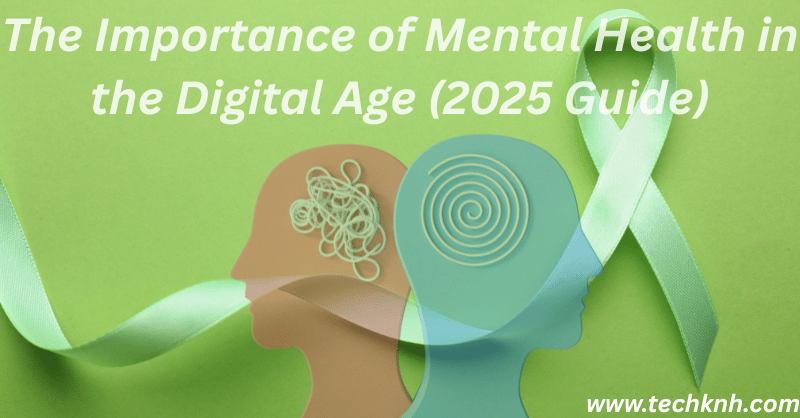Top Mental Health Tips in 2025

How to Stay Mentally Strong in a Fast-Paced Digital World
The present digital age has changed the way we live and work in many ways, but it has also brought new challenges to our mental well-being. With increased screen time, the stress of remote work, and information overload, mental health in 2025 is a trending and essential topic.
In this post, we’ll share 10 powerful mental health tips backed by science and practical experience to help you build emotional resilience, reduce anxiety, and thrive in the modern world.
Why Mental Health Matters More Than Ever
More than 1 in 4 people worldwide experience mental health issues such as anxiety, depression, or burnout. Whether you’re a tech enthusiast, student, professional, or entrepreneur, mental well-being is no longer optional: it’s a necessity.
The growing popularity of mental health awareness, mindfulness, and emotional intelligence demonstrates a shift toward prioritizing inner peace and sustainable productivity.
Trending Mental Health Challenges in 2025
These are the top mental health challenges being talked about this year:
Screen addiction and digital fatigue
Remote work burnout and lack of boundaries
Rising rates of social media anxiety
Fears of AI replacing jobs and causing professional stress
Sleep disorders due to excessive device use
Information overload and news anxiety
Understanding these trends can help us adopt strategies to overcome them.
Top 10 Tips to Improve Your Mental Well-being
Let’s explore the most effective ways to protect your mental health in 2025.
1. Practice a digital detox
Constant notifications from your phone, emails, and social media can drain your brain. Schedule “tech-free” hours daily to reduce anxiety and improve focus.
Tip: Try using apps like Forest or Freedom to block out distractions and regain your focus.
2. Prioritize quality sleep
Sleep is the foundation of mental well-being.
Trending tools:
Oura Ring for sleep tracking
Calm app for sleep meditations
3. Eat for mental clarity
Foods rich in omega-3s, magnesium, and B vitamins support brain function and emotional balance.
Essential aspects of a mental health diet:
Leafy green vegetables
Fatty fish (such as salmon)
Walnuts and chia seeds
4. Exercise regularly
Try:
30-minute walk daily
Yoga to relieve stress
Strength training to boost confidence
5. Practice mindfulness and meditation
. Even 10 minutes of daily meditation can reduce cortisol (stress hormone) levels.
Apps to try:
Mind Space
Information Timer
Waking Up by Sam Harris
6. Limit doomscrolling and negative news
Consuming bad news nonstop can lead to information anxiety. Set limits on your news consumption and instead follow uplifting content.
Pro tip: Use browser extensions that filter news or limit exposure to certain keywords.
7. Stay socially connected
Even introverts need human connection.
Online support networks:
Reddit’s r/mentalhealth
Facebook groups on mental wellness
Meetup for local mental health events
8. Journaling for emotional health
Writing down your thoughts helps process emotions, reduce stress, and clarify your goals.
Try: Gratitude journaling (3 things you’re grateful for daily)
Emotional release journals
Using app prompts like Day One
9. Seek therapy or counseling
Don’t wait for a crisis to ask for help.
Popular mental health services:
Better Help
Talk Space
7 Cups
10. Use mental health apps
Technology can help too! By 2025, mental health apps will be smarter and more personalized.
Top Picks:
Woebot: An AI-Powered Chatbot for Mood Tracking
Sanvello – CBT Tools for Anxiety and Depression
Moodfit: An All-in-One Mental Activity Tracker
Final Thoughts:
Make Mental Health Your Daily Priority
In a world that’s always “on,” your mind needs regular rest and support. By making small, intentional choices every day, you can protect your mental health and live with more clarity and peace of mind.
Your mental well-being fuels your productivity, your relationships, and your creativity. So be kind to yourself—your mind matters. more health tips
Mental Health FAQs in 2025
Q1: What are the biggest trends in mental health in 2025?
A: Digital detox, sleep hygiene, mindfulness, and AI-based therapy are important trends.
Q2: Are mental health apps effective?
A: Yes, many offer evidence-based tools for anxiety, stress, and depression. They are helpful for daily self-care, though they don’t replace therapy.
Q3: How do I know if I need professional help?
A: If you feel overwhelmed, anxious, or emotionally numb for more than two weeks, it is advisable to consult a licensed therapist.


